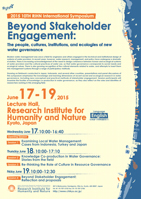RIHN 10th International Symposium
Beyond Stakeholder Engagement:
The people, cultures, institutions, and ecologies of new water governance
| Date: | June 17 - 19, 2015 |
| Venue: | Lecture Hall, Research Institute for Humanity and Nature (RIHN) (→ Access) |
| Organizer: | Research Institute for Humanity and Nature |
| Language: | English (simultaneous interpretation provided) |
| Participation: | Contact the address shown in the bottom of this page |
Symposium Outline:
Modern water management was once a field for engineers and others engaged in the technical and institutional design of systems of water provision. These systems linked construction of large-scale dams and canals to extensive hydro-electric power facilities, expansion of irrigated croplands, and urbanization, all of which were important components of state development in the 20th century, and remain so in the 21st.
Eighteen cities in the world now have a population of more than ten million people. Most of them are located in developing countries in tropical or temperate zones. These cities have created unprecedentedly intricate patterns of human-environmental interaction, each having massive influence on other cities and on the global environment. The Research Institute for Humanity and Nature (RIHN), Kyoto, Japan, is a home for a wide range of trans-disciplinary projects conducted in order to understand mutual relationships between humans and environments. Among them is the RIHN Megacity Project that began in 2009. Focusing on Jakarta, one of the 18 megacities, this six-year research project has mobilized approximately 100 researchers with diverse fields, including sciences, history and other social sciences and engineering, to identify how to mitigate global environmental problems while improving the quality of local peoples’ lives.
At the same time, water has re-emerged as an important ‘environmental’ issue, as an essential element affecting ecosystem productivity, biodiversity, and other material cycles, and so directly and indirectly implicated in contemporary environmental change. Understanding water today therefore requires links or leaps across disparate fields, sites, and kinds of social, ecological, administrative, and cultural knowledge or experience.
Confronting these conceptual and practical challenges in recent years, water research, management, and policy have undergone a dramatic evolution. There is increasing acknowledgement of the need for coherence between human and ecological systems of water provision and cultural practices of water use, so that water governance corresponds to social needs and ecological values. There is also growing recognition of the cultural elements related to water, and attempts to insert them into management systems through a range of participatory methods.
Drawing on fieldwork conducted in Japan, Indonesia, Turkey, and several other countries, this symposium emphasizes the knowledge and learning dimensions of recent social and ecological research in water governance, and reflects on recent conceptual and practical methods of stakeholder engagement. Session participants will examine the frontier of knowledge co-production in water governance as they also reflect on the roles and identities of researchers working in this emerging field.
- Opening Session
- Session 1: Examining Local Water Management: Cases from Indonesia, Turkey and Japan.
- Session 2: Knowledge Co-production in Water Governance: Stories from the field.
- Session 3: Re-thinking the Role of Culture in Resource Governance.
- Session 4: Beyond Stakeholder Engagement: Reflection and proposals
→ Go to Program (You can download abstract)
Contact:
International Affairs Subsection
Tel: +81-75-707-2152
Fax: +81-75-707-2106
E-mail:



 click
click